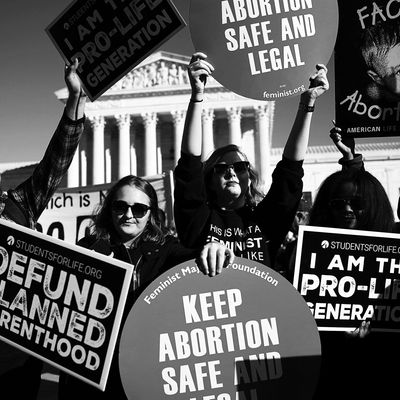
The outrage following Alabama’s extreme abortion ban, which would make it a felony to terminate a pregnancy in almost every circumstance, was loud and immediate. Horrified pro-choicers flooded Twitter with grim conclusions as soon as the measure passed the Senate: that abortion will be illegal in Alabama from now on, that rape victims who choose to end their pregnancies will be punished more harshly than the rapists who impregnated them. A CBS article about an 11-year-old girl who had suffered repeated rapes went viral by implying in the headline that she would be forced to deliver her attacker’s child.
None of this is true — at least, not yet. The law isn’t set to take effect for six months, and it will almost certainly be blocked before then because it is blatantly unconstitutional; the ensuing legal battle could take years to unfold. The same is true for the recent six-week ban in Georgia, which was the most brutal and dehumanizing abortion restriction passed in 2019 until Alabama came along. This doesn’t mean neither poses a serious threat: Conservatives introduced both measures with the hope that one would make its way to the Supreme Court and overturn Roe v. Wade, opening the door for lawmakers throughout the country to strip women of their basic bodily autonomy while bestowing clumps of cells with inalienable rights.
In the meantime, though, abortion remains legal everywhere in the United States. Women in Alabama can still obtain abortion care without being criminalized; pregnant rape victims do not yet have to choose between potential jail time and forced motherhood. Although it’s tempting to speak about the recent bans in sweeping, incendiary terms — to point out the cruelties that can and will result from legislation like this actually taking effect — it’s crucial to be clear on this point. To say abortion has been effectively banned is to risk unintentionally convincing women that their right to choice has already been legislated away. It has not.
The strategy employed by anti-abortion groups has never been to take away our rights in one fell swoop. It’s been death by a thousand cuts, attacking Roe in tedious, bureaucratic increments: quietly forcing clinics to shutter by instituting onerous and medically unnecessary regulations on things like hallway width or the size of procedure rooms; making women endure longer and longer waiting periods before their appointments; outlawing certain types of procedures, one by one. It’s much easier to rally behind a sentiment like “Alabama legislators have just made abortion illegal” than one like “Alabama legislators have passed a very severe bill which will not be immediately enforced, but is rather part of an insidious, ongoing attack on reproductive rights, one that will eventually make its way to the highest court in the land, though we can’t be sure exactly when or how.”
But the distinction needs to be made, especially since we already know what happens when women believe that safe and legal abortion isn’t available to them. A 2018 study found that a third of American women searching for advice on self-terminating were unsure whether abortion was a crime where they lived, and the newest spate of bans is sowing even more confusion — providers say they’ve been fielding calls all week from terrified patients who no longer know if they can still access legal care.
Reproductive rights in Alabama have already suffered a thousand cuts. All but three clinics in the state have been forced to close their doors, and patients are mandated by law to make two separate trips, a full 42 hours apart, before getting an abortion. Procedures cannot be funded by Medicaid or state health insurance, and women must incur additional costs just to reach the few remaining providers; some have to drive up to eight hours one way for an appointment or sleep in their cars overnight. This reality won’t change, even if the law is blocked or struck down.
We should be worried and enraged by what’s happening across the country, and we should fight back with all we have — not just against the new bans, but also against the byzantine obstacle course lawmakers have spent years erecting around abortion access, which primarily affects people who are already in vulnerable situations: poor women, women of color, immigrant women, those who live in rural areas. We also owe it to them to make sure that they know what their options are as long as those options still exist.




